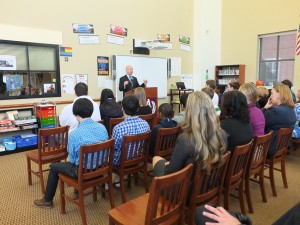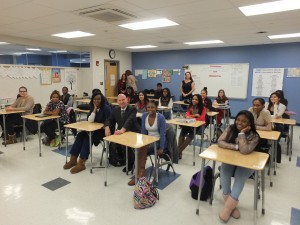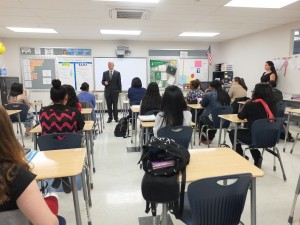Nearly $500,000 provided to support Pathways to Prosperity initiative to prepare students to excel in today’s economy
Dover, DE – With the support of grants announced by Governor Markell today, 15 Delaware high schools, spread across the state, will launch intensive programs in the fall to prepare students to excel in key fields that offer good job opportunities in the new economy. The grants, totaling nearly $500,000, are part of the Governor’s Pathways to Prosperity initiative, initially previewed in his State of the State address.
“Every Delaware student must have access to an education that best prepares him or her for our changing world – a world in which it is more important than ever for our citizens to have the right skills,” said Markell. ” Pathways to Prosperity is establishing the necessary partnerships with Delaware employers, universities, and school districts to prepare students for a bright future in high-demand fields and careers.”
Grant funds will be used by school districts to implement career and technical education programs in Biomedical Science, Computer Science, Culinary Arts & Hospitality Management, and Engineering beginning in the 2015 – 2016 school year. Through this effort, students will take hundreds of hours of specialized instruction and hands-on training. They will have the opportunity to graduate with workplace experience and college credits for courses that are most relevant to those industries, giving them a head start on getting a job and earning a degree.
Each program was developed in partnership with Delaware employers and institutions of higher education. The Department of Education is providing curriculum support for each pathway as well as training for teachers to successfully implement the coursework. In addition, the Department is working on agreements with Delaware colleges to ensure that students who complete a program will be eligible for college credit at one or more institutions of higher education in the state.
“We are proud to support our school systems as they implement rigorous career and technical programs, and create opportunities for all children to find success after high school,” said Secretary of Education Mark Murphy, who is leading the state’s investment of its federal career & technical education funding to defray the cost of providing these programs.
An additional $500,000 will be made available in the fall of 2015 to fund programs for the following school year. Districts will be able to use that funding in a variety of ways to support students and staff, and to provide the services and materials required to offer courses and hands-on training opportunities. More information on each program and the list of school districts that received grants is available on the Department of Education’s website at http://dedoe.schoolwires.net/Page/293.
“The turnaround time on developing a plan and applying for the grant was incredibly short, so I am extremely impressed with the districts that have shown the determination to provide these opportunities to their students as soon as possible, and that rose to the occasion to get pathways off the ground so quickly,” said Markell. “Students across our state can benefit from workplace learning and high-quality training in growth industries and all of us will benefit from having our students ready for college and a career in the new economy.”
—
Building on Success
The new pathways build on the accelerated career path program the state launched in manufacturing this school year when Colonial and New Castle County Vo-tech School Districts partnered with Delaware Tech and the Delaware Manufacturing Association. More than 30 juniors in New Castle County are spending part of each week at Delaware Tech. They learn math and other skills most important for that industry and work with equipment, aiming to earn industry-recognized credentials and college credit before they graduate. This summer, they will receive paid internships at Delaware companies like Agilent Technologies, PPG, Kuehne, and Siemens.
—
Grant Recipients
Appoquinimink School District
Appoquinimink High School – Computer Science and Engineering
Middletown High School – Engineering
Brandywine School District
Brandywine High School – Culinary Arts & Hospitality Management
Mount Pleasant High School – Culinary Arts & Hospitality Management
Caesar Rodney School District
Caesar Rodney High School – Culinary Arts & Hospitality Management
Christina School District
Glasgow High School – Biomedical Sciences
Colonial School District
William Penn High School – Culinary Arts & Hospitality Management
Laurel School District
Laurel High School – Biomedical Sciences and Culinary Arts & Hospitality Management
New Castle County Vo-Tech School District
Paul M. Hodgson Vo-Tech High School – Engineering
Newark Charter High School – Computer Science and Engineering
Polytech School District
Polytech High School – Engineering
Red Clay School District
McKean High School – Culinary Arts & Hospitality Management
Seaford School District
Seaford High School – Culinary Arts & Hospitality Management
Smyrna School District
Smyrna High School – Engineering
Sussex Academy – Engineering
—
Four Pathways
Biomedical Sciences and Engineering Pathways
Curriculum and assessments are developed in partnership with business and industry, and higher education, with course specific professional development offered to teachers by higher education partners. The Biomedical capstone course requires students to conduct scientific research with industry partners. The Engineering capstone course requires students to design an invention in partnership with an industry panel.
Key partners include: the University of Delaware, Delaware State University, Delaware Tech, and Project Lead The Way.
Computer Science Pathway
The computer science pathway includes two advanced placement courses, a curriculum developed in partnership with business, industry, and higher education, and course-specific professional development offered for teachers by higher education partners. Both AP courses require students to engage with business and industry partners to design websites and applications, and develop methods for data collection and disaggregation.
Key partners include: the University of Delaware, Delaware State University, Delaware Tech, code.org, and The College Board.
Culinary Arts & Hospitality Management
Students benefit from an industry-focused mentorship, a curriculum developed in partnership with business and industry and higher education, and course-specific professional development for teachers. They will have the chance to earn the ProStart Certificate of Achievement, which signifies a strong foundation in management and culinary skill that includes both technical knowledge and 400 hours of mentored work-based learning experience.
Key partners include: the University of Delaware, Delaware Tech, the National Restaurant Association, and the Delaware Restaurant Association, which will help arrange mentors and work-based learning opportunities.
###

